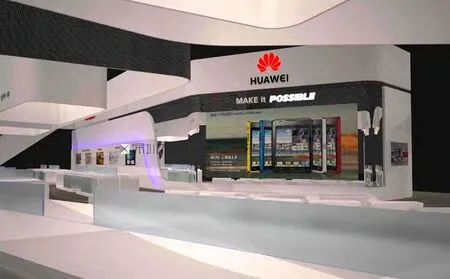Big Talks Inspire
By Zhou Liuzheng

Ren Zhengfei is the founder and president of Huawei Technologies Co.Ltd.Huawei overtook Ericsson in 2012 as the largest telecommunicationsequipment manufacturer in the world, and overtook Apple in 2018 as the second-largest manufacturer of smartphones in the world, behind Samsung Electronics.It ranks 72nd on the Fortune Global 500 list.
I n the early days of Huawei, the office was located in a dilapidated residential building to save money.The poor office facilities and harsh working conditions did not block them in their initial stages.Ren Zhengfei was like a preacher, often working with employees, eating together, and bragging about their future.
Actually, many of Huawei’s senior managers and original employees have been inspired and attracted by Ren Zhengfei’s “boastful” remarks.
Pooling Talents
Guo Ping entered Huawei in 1988—the second year after its establishment.Previously, he was a young teacher at Huazhong University of Science and Technology.Ren Zhengfei often invited teachers and students from universities and research institutes to visit Huawei in order to solve the problem of insufficient scientific research personnel in his early years.Guo Ping was inspired by Ren Zhengfei’s promising blueprint and abandoned his position as a university teacher to become the project manager of Huawei’s second independent research and development project.
As a project manager, Guo Ping did not have much sense of the market for Huawei, but he strengthened Huawei’s confidence in taking the road of independent technology research and development.What’s more, he succeeded in convincing his classmate Zheng Baoyong to give up his doctoral studies at Tsinghua University and join Huawei.
In 1989, Guo Ping repeatedly attempted to persuade his classmate Zheng Baoyong, who had not yet received his doctorate, to hurry off to Shenzhen and join Huawei.Huawei was very short on technicians in its initial stage.Ren Zhengfei knew nothing about communication technology, so he appointed Zheng Baoyong as chief engineer of the company.Sure enough, Zheng Baoyong did not frustrate the public expectations.Along with his colleagues, he successfully developed the first self-developed product of Huawei—the HJD48 miniature analog air separation user switch.
In 1992, HJD48 was put into the market and had great success.That year Huawei’s sales easily topped one hundred million yuan.Ren Zhengfei was so excited that he burst into tears, exclaiming that Huawei had survived at last.After Huawei implemented the job number system, Ren Zhengfei’s number was 001 and Zheng Baoyong’s was 002, which ranked ahead of Guo Ping.As Chief Engineer, Zheng Baoyong at that time was responsible for the research and development department and became Huawei’s “No.2 Chief Executive.”
That year, Ren Zhengfei was able to convince a young teacher to give up his job and join Huawei while the latter persuaded his good friend to abandon his doctorate degree at Tsinghua University and join a company with slim future.Ren Zhengfei’s superb ability of “bragging” was really admirable.
Marketing Ambition
Liu Ping, who once served as Huawei’s executive vicepresident, recalled, “Chief Ren always chats with the development teams, sometimes inviting us to have midnight snacks together.He is really a great motivator.Every time I listen to him, my blood boils with excitement.That’s the spiritual power that motivates me at Huawei.”
Another kind of “bragging” was Ren Zhengfei’s bold predictions at the outset of his entrepreneurship: “Ten years from now, Huawei will surely occupy one third of the world’s telecommunications market.”While it did receive some criticism, it was enough to prove that Ren Zhengfei was full of idealism and even romanticism.
At that time, the world communications market was still dominated by big international companies.Those godlike rivals could ignore Huawei’s existence.In the eyes of many Huawei employees, their boss was just bragging.Now, thirty years later, that “big talk” has come true, whereas many of those godlike rivals have vanished.
To the counterparts in the United States, Ren Zhengfei has held a learning attitude.In 1997, Ren Zhengfei visited hightech companies in the United States and wrote an article entitled “What We Can Learn from the American People,” which appreciated their sound management, open attitudes, innovation mechanisms and innovative spirit.
Huawei’s attitude to the United States, the world’s most powerful country with the highest technological level, is to learn smartly, and to be respectful but uncompromising.
Fight and Lose Repeatedly
In early June of 2016, the US Department of Commerce issued a summons to Huawei, demanding Huawei to provide all information about exports to North Korea and other countries in the past five years.If Huawei was found to violate the US policy, it might be punished by restricting Huawei’s access to key American-made parts.
Ren Zhengfei’s previous strategy was to keep a low profile, try to avoid a direct competition with American companies, and compromise if he could.In 2011, with the direct intervention of the US Department of Commerce, Huawei’s cooperation with Sprint failed.Ren Zhengfei finally laid down his spiritual burden, feeling that “American pride and prejudice made us stand up and face the competition directly instead.”
In 2013, Ren Zhengfei once again “boasted” in his speech, “Those who are reluctant to take out their territory are not strategists.You should go to see the movie entitledFight North and South.Don’t care about the gains and losses of one city or place because what we aim at is the whole world market.Someday, we will fight back and enter into the United States.What is ‘Smart Walking’? It means to enter America with honor.”

Ren Zhengfei still carries the banner of idealism and encourages the morale of the company by “boasting” in the face of repeated battles and defeats in regards to entering the US market, but he is more rational and graceful than ever.
In 2015, when asked about why Americans targeted Huawei, Ren Zhengfei responded calmly, “I never thought the United States was bad or unfair to us.” He even said that Huawei should learn from the United States and integrate into the world with a broad mind so as to have a fruitful future.For a country like the United States, it is better to make yourself stronger than to spend energy and money lobbying.As Ren Zhengfei said, “We are like two-winged magic horses galloping on the prairie; nothing can stop us from forging forward but our internal inertia and corruption.”
(FromHuawei Blazes a New Trail, China Machine Press.Translation: Qing Run)
牛皮還是要吹的
文/周留征
華為創立初期,節約成本考慮,辦公地點選在一幢破舊的居民樓里。辦公設施簡陋和工作條件艱苦,并沒有成為華為起步時的主要問題,任正非就像一個布道者,經常和員工一起工作,一起吃飯,一起吹牛皮、談理想。
華為創業元老,很多都是被任正非 “吹牛”吸引過來的。
拖人下水
郭平1988年,也就是華為成立的第二年,進入華為公司。此前,他是華中理工大學的青年教師。任正非早期為了解決科研人才不足的問題,經常邀請一些高校和科研院所的老師與學生到華為參觀。郭平被任正非描繪的宏偉藍圖打動,放棄了高校老師的身份,成為華為第二個自主研發項目的項目經理。
郭平作為項目經理,對華為來說,沒有太多市場意義,但是堅定了華為走自主技術研發道路的信心。更重要的是,他成功地將同學鄭寶用說服,放棄清華大學的博士學習,加盟華為。
1989年,架不住老同學郭平反復勸說,博士學位還沒拿到的鄭寶用奔赴深圳,加入華為。初創時期的華為非常缺乏技術人才,任正非也不懂通信技術,隨即任命鄭寶用為公司總工程師。鄭寶用果然不負眾望,帶著眾兄弟苦干一場,開發出華為第一款自主研發的產品——HJD48小型模擬空分式用戶交換機。
1992年,HJD48投放市場,取得巨大成功。當年,華為銷售額就輕松突破億元大關,任正非激動得熱淚盈眶,感嘆華為終于活下來了。華為實行工號制度之后,任正非的工號是001號,鄭寶用的工號是002號,排在郭平之前。作為總工程師,此時的鄭寶用統管研發體系,成為華為名副其實的“二號首長”。

當年,任正非能夠讓一位年輕的老師放棄穩定的工作加盟華為,這位老師還能說服自己的好朋友放棄清華大學的博士學位加入一家前途未卜的公司,讓人不得不佩服任 正非高超的“吹牛”能力。

三分天下
曾經擔任過華為執行副總裁的劉平這樣回憶:“任總經常到開發組和大家聊天,有時,還請我們去吃夜宵。任總真是一個很好的鼓動家,每次聽他講話,搞得我熱血沸騰。那是支撐我在華為干下去的精神力量。”
還有一次典型的“吹牛”案例,是任正非創業之初的豪言:十年后,世界通信市場三分天下,華為必占其一。關于任正非提出華為要在通信市場三分天下的說法,一直流傳幾個不同的版本。無論是哪種說法,足以證明任正非當年的確是像打了雞血一樣,充滿了理想主義甚至是浪漫主義色彩。
那個時候,世界通信市場還是國際大公司的天下。無論如何比較,那些神一樣的對手都可以無視華為的存在。在很多華為員工眼里,老板就是在吹牛而已。30年后的今天,那些任正非當年吹過的牛皮,竟然已經實現了。當年那些神一樣的對手,已經煙消云散。
對于美國,任正非一直抱著學習的態度。1997年任正非就跑到美國的高科技公司參觀,寫了一篇《我們向美國人民學習什么》的文章,對美國的管理水平、開放意識、創新機制和創新精神等大加贊賞。
對于世界上最強大的國家,也是技術水平最高的國家美國,華為的態度是學習但不迷信,尊重但不妥協。
屢戰屢敗
2016年6月初,美國商務部向華為發出傳喚,要求華為提供過去五年向朝鮮等國家出口的全部信息,如果發現華為違反美國政策,有可能以限制華為獲得關鍵美制零部件作為處罰。
任正非以前的策略是韜光養晦,盡量回避與美國公司正面競爭,能讓就讓一把。2011年,在美國商務部直接干預下,華為與美國Sprint公司的合作項目失敗。任正非終于放下精神包袱,認為“美國的傲慢與偏見,反而使我們挺起了胸脯,直面競爭”。
2013年,任正非在內部講話中再次“吹牛”:“不舍得拿出地盤來的人,不是戰略家,你們要去看看《南征北戰》這部電影,不要在乎一城一地的得失,我們要的是整個世界。總有一天,我們會反攻進入美國的。什么叫瀟灑走一回?光榮地走進美國。”

雖然這次任正非在開拓美國市場屢戰屢敗面前,繼續扛起理想主義的大旗,繼續通過“吹牛”為組織鼓舞士氣,但是多了一份理性和從容。
2015年,當任正非被媒體問及美國對華為的一再阻撓時,他平和地做出回應:“我從來就沒有認為美國對我們不好或不公平。”他甚至說,華為要學習美國的開放,用廣闊的心胸融入世界,這樣才有未來。對美國這樣的國家,與其花精力、花金錢去公關游說,不如讓自己變得更為強大。正如任正非所說:“我們像雙翼的神馬,飛馳在草原上,沒有什么能阻擋我們前進的步伐,唯有我們內部的惰怠與腐敗。”
(摘自《華為創新》機械工業出版社)

